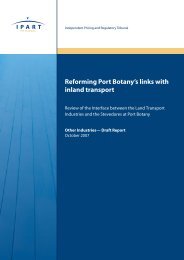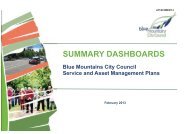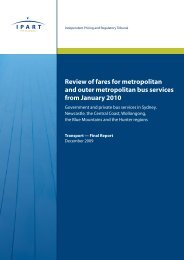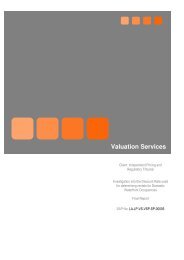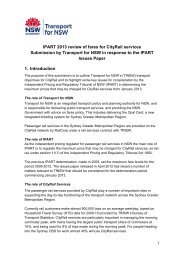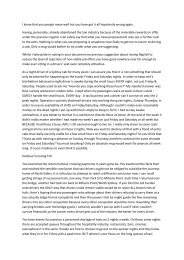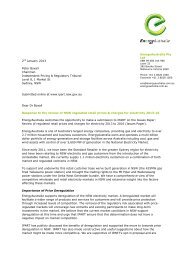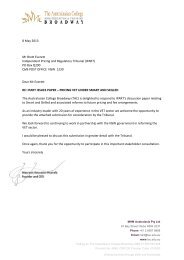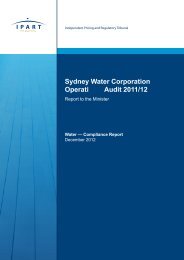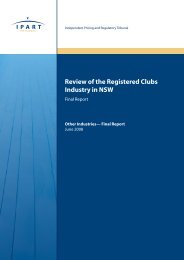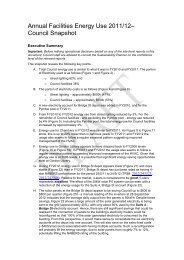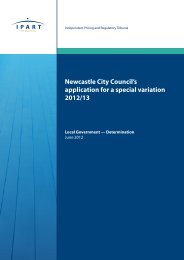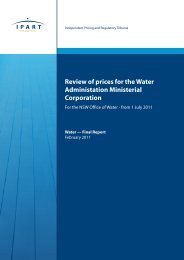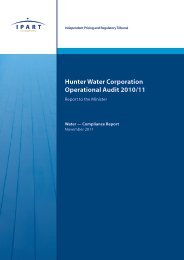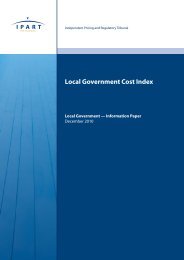Regulation Review - IPART - NSW Government
Regulation Review - IPART - NSW Government
Regulation Review - IPART - NSW Government
Create successful ePaper yourself
Turn your PDF publications into a flip-book with our unique Google optimized e-Paper software.
3 Identifying reform opportunities<br />
The PC reports that businesses are better able to determine the viability of<br />
proposed licensed premises if they have clear information about likely<br />
operational requirements at the project inception stage. It consequently notes<br />
that some councils (eg, Byron Shire Council) have a clear and publicly available<br />
policy indicating the development conditions they will place on approvals for<br />
licensed premises and the criteria they have for supporting a liquor licence<br />
application to the relevant state regulator.<br />
The PC also states that prospective liquor licence applicants would benefit from<br />
state licensing regulators providing explicit advice to them on the approvals that<br />
they need to get from local government. 73<br />
Liquor licensing can also be a contentious area of regulation for the community.<br />
This is currently evident in relation to licensed premises in Kings Cross, Sydney.<br />
Food Safety<br />
<strong>Government</strong>s at all levels have invested significant resources in improving food<br />
safety regulation throughout Australia. While the divergent approaches<br />
implemented in different states or by individual councils impacts on the goal of<br />
nationally consistent food safety regulation, the variation provides a wealth of<br />
opportunities for identifying leading practices. The range of approaches include:<br />
<br />
<br />
<br />
<br />
<br />
Excluding businesses selling only negligible risk food from food safety<br />
regulation and enforcement (Victoria, Tasmania and Western Australia).<br />
Using risk and compliance history information to improve regulation of food<br />
businesses (used by a number of local governments in Australia).<br />
Using standardised forms (<strong>NSW</strong> Food Authority).<br />
Enhancing public transparency, through:<br />
– easily accessible information explaining the basis for policies and especially<br />
the reasons for differential treatment (<strong>NSW</strong> Food Authority)<br />
– publishing information on regulatory activities (fees and charges,<br />
frequency of inspections, etc) and the results of compliance activities (New<br />
South Wales, South Australia, Queensland and Western Australia report on<br />
some items, while some local governments provide all such information).<br />
Precluding the need for multiple registrations – Victoria, Queensland and<br />
Western Australia enable mobile food vendors who operate in multiple local<br />
government areas to be registered once. There is concern that some councils<br />
across Australia can require a single food business such as a supermarket,<br />
which has multiple departments (eg, bakery, deli, butcher and seafood<br />
departments), to register individual departments as separate food businesses.<br />
An approach similar to that used for mobile food vendors could be warranted<br />
to clarify what should be considered a single food business and what should<br />
be considered separate.<br />
73 Ibid, p 383.<br />
46 <strong>IPART</strong> <strong>Regulation</strong> <strong>Review</strong>



